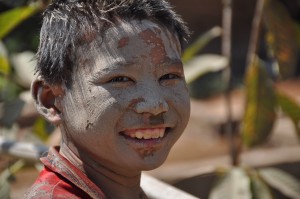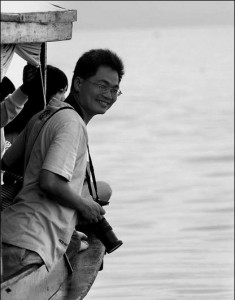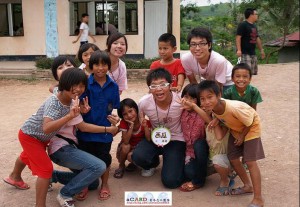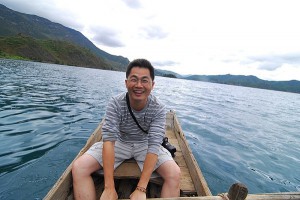
“If we listened to those who are cast as wretched, then perhaps their wretchedness would no longer belong to them. The sorrow of the stranger might give us a different angle on happiness, not because it teaches us what it is like or must be like to be a stranger but because it might estrange us from the very happiness of the familiar.”—Sara Ahmed
We said Mr. Adam Lin (林志昇) was picky. He picked up all the possible defects in our plan but never exactly told us what the plan should be like. He looked strict, hard to please, at least during the time we students were doing volunteer service in Cambodia last summer, with him as the project conductor and our “Teacher Lin.” One morning in Cambodia, we were informed that the original schedule was canceled, but it was the only information we got. We ran to catch Lin before he left and asked for the new schedule, and he answered sullenly, “Why do you ask me? Shouldn’t you have an idea about what you are going to do?” It was like a punch on my face, and from then on we tried not to depend on his directions, and Adam Lin became rather distant from us. Therefore it is surprising to see on the online bulletin of the volunteer team that former service participants make fun at Adam Lin like old, same-aged friends, as if there is no generation gap between the early twenties and the forties. Lin treats them like his friends and children, being proud of their personal accomplishments and sometimes bringing them souvenirs from his trips. Under the tea table in Lin’s living room, surprisingly, many foreign sweets were hidden. Before the interview, he conjured them out and exhibited the colorful containers on the table. There were two bottles of strawberry sticks, packages of dried laver from Thailand, and some others I cannot name. They were for his daughters—his elder daughter dislikes strawberry however—and the volunteers who asked for souvenirs.
Since our team finished the project, I had had no contact with Adam Lin for almost six months. It was until I attended the presentations about the two new projects which were also led by Adam Lin to ask for the permission to have an interview. Adam Lin gave the opening speech and after the presentations gave advice on the performances. He wore a white T-shirt with red team logo, a beige pants, and a pair of brown slip-ons. He looked quite comfortable at his place, and most of the time he just took pictures of the students, the teachers of the students, and other participants. As a former team member, I listened to the advice which was once for us and saw the same confusion on those young faces. Lin suggested them to modify the content of their presentations, to give more explanation of the motives of their activities, not only to describe what they had done. I could almost look into their brains and see them spinning. It was not easy to answer.
To speak fairly, Adam Lin does not look strict. His face is actually full of drama. He has exaggeratedly thick eyebrows, big eyes with a pair of thin-framed glasses, and a large mouth that looks as if there is always something funny deserving a loud laugh. When we were in Cambodia, I saw only troubles accumulating with his comments, and ignored his smiles and unique high-pitched laughs.
Lin’s home is on the top floor of a common apartment building, located at a long, less commercialized street in Sanchong, New Taipei City. The stairway up to his home is narrow, allowing only one person to pass. The first thing I saw after finishing the last few stairs was a big Christmas tree decorated with small dolls, colorful balls, and a string of small light bulbs. The veranda was boarded over. On the veranda, there were a picnic table and two blue little chairs at the front, and some boxes piled up at the rear end. The living room was crowded with all sorts of things. Picture books occupied the shelves; peacefully smiling animal toys and decorations quietly rested in discreet corners. It was like stepping into a little paradise you had dreamed in your childhood. The living room was not tidy or wide in any kind, but its slight chaos could be viewed as a welcome for energetic thoughts. “You can take pictures, but please kindly avoid the untidy part. I know it isn’t clean.” He said and laughed. A large bamboo nest hanged nearby the working zone that was enclosed by computer, printer, fax machine, and a shelf of folders. Inside the nest laid pillows and a pink stuffed rabbit. I could see his daughters’ drawing tools unsuccessfully concealed behind the drawing board.

The volunteer team I attend is called aCARD Youth Volunteer Team. aCARD is the abbreviation of Association of Culture and Art Resources Development(中華藝文資源發展協會), which provides financial support for its subdivision, aCARD Youth Volunteer Team. This seemingly complicated system was founded and now is mainly run by Adam Lin alone. Before the volunteer team, he was devoted to another profession, as the leader and the founder of Cloud Dance Theatre (雲舞者舞蹈團). It is a dance troupe which is specialized in performing Chinese folk dance, but now Lin has left its management to the artistic director. Though Adam Lin’s position is the chief of these organizations, he has “to do everything” before he finds enough people to participate in the business. Therefore, he expects some volunteers to join his enterprise after they graduate from schools.
Before Lin embarked on his career in conducting volunteer service, Lin had work experiences in divergent fields: a dancer of Taipei Folk Dance Theatre, a training specialist for Nike, and a lecturer on child care in several private colleges. Lin started his dancing lessons when he was already 19 years old. He took courses in Department of Dance in the university. With dramatic gestures and an excited voice, Lin recalled his first dancing class. The teacher asked the whole class to do splits, and the class did it, while he “got stuck half way!” The teacher almost lost her mind when she knew she got a beginner from the Department of Child Welfare. “She stepped back and yelled, ‘who allowed you to take the course?!’” Though it was “a little embarrassing,” Lin did not care too much. As long as there was no school law against it, he only thought of giving himself a try. There Lin received basic training in Chinese opera, folk dance and modern dance. Later he used it to win the screening of CYGM(Chinese Youth Goodwill Mission中華民國青年友好訪問團), and got the chance to perform folk dance in Europe and Middle East. A senior CYGM member told Lin after the screening test, “I guess you will be accepted. You have ‘the CYGM face’.” The candidates that CYGM looked for were people who were not afraid of embarrassment and could smile wholeheartedly on stage. “The CYGM face” was a face with a stage charisma.
Adam Lin started to organize volunteer teams when he was teaching in a private college. The first place they visited was Kinmen, an island county of Taiwan. At that time he already had a feeling that “the more different the destination is in culture and in lifestyle, the more my students will learn.” He said that idea might originate from the experience in CYGM. Traveling with CYGM was Lin’s first chance to go abroad. It was late 1980s, and in Taiwan “people rarely went travel”. “If not CYGM, I was unlikely to go abroad. In my first journey, I went to 13 countries, more than 60 days. That changed me a lot.” Lin grew up in countryside. The experience of performing Chinese traditional art while traveling showed him a world that was not as distant as he saw on the TV or in textbooks. Lin started to think, “What does the world mean to us? What is a world citizen?”
Because of that experience, he did not hesitate to explore possible serving places in overseas, when he gained enough experience in leading volunteer teams. He contacted his relatives in Vietnam and cooperated with Eden Social Welfare Foundation (伊甸社會福利基金會), a well-known Taiwanese NGO which has branch offices in Southeast Asia. At first, Lin brought his students to the schools that cooperated with Eden Foundation, but not long after that, he began to rely on his relationship with the locals, and had contact with other local schools to which no Taiwanese volunteer team had given helping hands yet. For a few years, he led students to do volunteer service as a school teacher, but gradually he could not stand the inefficiency of the education system and thought of leaving. “I can have more room if the whole thing is controlled by myself. I can do whatever I like.” He was frustrated by the arrogant attitude from the school, which only wanted the achievements of Lin’s volunteer team and was reluctant to provide financial support. He also found it was hard to include his colleagues in the volunteer team, because their strong self-esteem could not even allow Lin to ask them to supervise the students to do cleaning.

After leaving the school, Lin had more opportunities to work with college students from different schools. Though college students are inexperienced, Adam Lin believes what will be left in our memories is what we have experienced, organized, and learned. “Being a volunteer, you have to work,” he said in the affirmative, “students may not turn in a perfect result, but at least they’ve tried. That is the trace of their growth.” He was less patient in the past, often took over students’ work and taught them by doing the work for them in front of their eyes. However, as it turned out, he learned from the practices, whereas the students came and left with less opportunity to try. “Even though I may be more experienced, I cannot guarantee that my way will fit in every situation. I don’t want to let students shift their responsibility on me.”
“In earlier years, when the team was smaller, this living room was where the students had their discussions. The students would sit on this sofa, and I would sit over there working on my computer, and I could hear them.” He prefers to be a “consultant” rather than a “baby sitter.” “From time to time, I would suddenly say something to them, mostly a question, ‘Do you think that will work?’ and return to my work.” He mimicked the stupid face of the student who suddenly remembered the point they missed. “I want their every action to have its reason. The only thing I need to do is to ask why and how. Even when the direction is given by me, they have to approve it by themselves. So that what they do will become their own.”
Lin also believes in the magical charm hiding inside overseas volunteer service. Helping individuals within Taiwan, the volunteers may learn to sympathize with people from different family backgrounds and social classes. However, helping people with entirely different cultural backgrounds may facilitate one to rethink one’s mother culture as a whole. Seeing different living styles which are determined by their natural and cultural resources provides volunteers a chance to see and examine the resources they have but have been taken for granted. If there is someone else who can live under different environmental conditions, why can we view ours as the only and best way and refuse to make any change? Lin compared culture to a pot of hot water, and people living inside are like frogs unaware of the lowly raising temperature. People are not aware of their living, except when they are suddenly thrown into another pot of boiling water. “Without experiencing unfamiliar cultures, we tend to neglect many important things.” I recalled that after I saw half-naked Cambodian children playing happily in turbid water, I began to think why the view was so astonishing for me. I could not even imagine myself touching that water. At that moment I realized how different we had been taught, and that education was based on the clean water we had.
Being an overseas volunteer is not the same as having a group tour. For the latter, everything on the schedule is settled by the travel agency; the tourists never have to worry how they can move from place to place, and what they eat and see is chosen, far away from the real circumstances. The culture experienced in the group tour is “the culture of the travel agency.” On the contrary, living in a particular area for a period of time, participating in the local daily life, and interacting with locals brings more profound understanding. The experience is not packaged and sold in travel agencies, traveling programs, or geographical books, but is felt in person and digested. Lin said with great confidence, “There is no travel agency that can promise a trip will be remembered for twenty years, but a volunteer team can.”
The only difficulty that has troubled him is confronting members’ different understanding of being a volunteer. Some people spoke more than they did, and because volunteers should act out of their will, Lin could not force them to give up the tourist’s enjoyment. “They were enticed by the glory clustered around being volunteers, but they didn’t really want to do it.” Preparing activities for local children occupies much of the time of the journey, so “if it is not a good volunteer service, then it will be a bad group tour.”
Running the volunteer team for Adam Lin is “presenting my values.” It confirms him in his belief. He does not want to be a philanthropist, pouring money into places regarded to be relatively poor, but to conduct volunteer services and to take it as an opportunity for two groups to exchange their needs and strengths. The idea of service learning comprises both giving and learning. Through the process, Lin has perceived positive energy of life. “It is better than being locked in an enclosed institution, people being like fish crammed in a small pool and fighting with each other. I feel more like being in the sea—we can pick up each other, and learn from each other.”
Lin is still not sure about his future plan. He ponders if he is going to find a full-time job after he gets his doctor degree in education, or to expand the scale of aCARD Youth Volunteer Team to be his full-time occupation. The only thing he feels sure about is that he will not stop organizing the volunteer team. “Since now I am so good at it,” Lin said with his loud laugh. He likes the sense of refreshment he obtained from every journey. It brings him a new direction and energy. “It attracts me, so I voluntarily spend my time on it. That impulse inside cannot be denied.”
